
LANY frontman Paul Klein is in Auckland, New Zealand, midway through his 80th show out of a whopping 100 shows currently scheduled on the ‘Malibu Nights’ world tour, and he’s sharing an anecdote with the audience about how earlier that day, a local doctor informed him that the chances of him being able to get up on stage and play the show that evening were 50/50. “I refuse to cancel a show at this point,” he declares, much to the delight of the sold-out venue - attendees who are hanging onto his every word and clearly very relieved that he did make it to the show that evening.
And Klein has not only made it to the stage, but is bouncing and dancing around with more energy than most people have when they’re at full health, encouraging fans to sing along during every song, and give it their all - a rare feat that rings true to his hardworking ethic, that extends beyond the live show, and to all things LANY.
During the 90 minute show, I notice a fan standing in front of me, running his hands down his face like an emoji come to life, shook to his very core by the experience of seeing his favourite songs performed live in a relatively intimate setting - and that’s testament to the power of music, and the power of LANY.
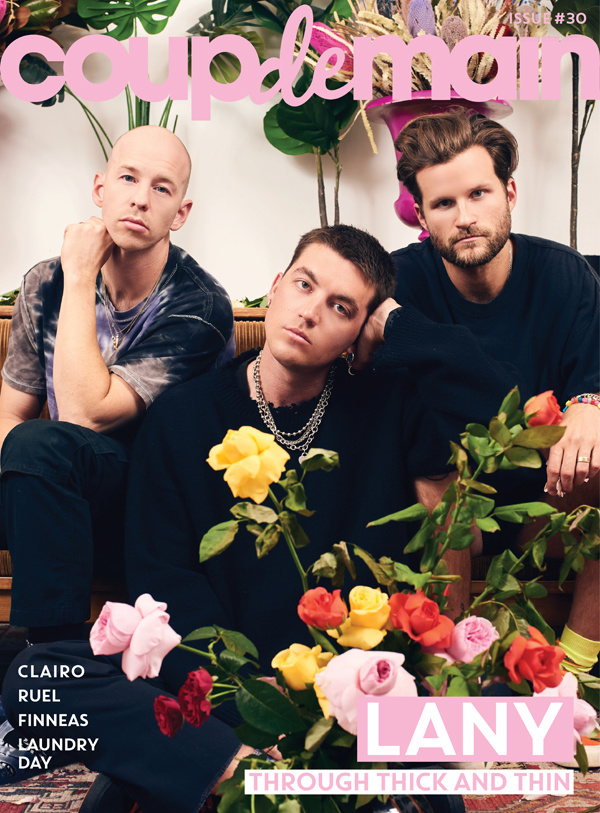
Click here to order a CDM x LANY zine (i.e. a mini-magazine featuring photos + quotes from this cover-story).
Five years ago, LANY were a sprout of an idea after Paul Klein (at the time a solo musician trying to make it in Los Angeles) flew to Nashville to meet with Jake Goss and Les Priest (who previously made music under the name WRLDS), and started to work on music together. After sharing their first songs onto Soundcloud and gaining traction, a musical brotherhood founded on trust, dedication, and hard work was formed.
From that point on, the band’s profile continued to grow, with songs like ‘ILYSB’ and ‘Where The Hell Are My Friends’ entrenching their ever-growing devoted fanbase of kids growing up online (“Friday, wine, and the internet,” he relatably sings about on the latter), to whom LANY have become a hugely important part of their lives - with tattoos, travelling for live shows, and making life-long friends just a part of the ride of the fandom.
Releasing their debut self-titled album in mid-2017, the band didn’t slow down at all, following it up with the heartbreaking ‘Malibu Nights’, an album Klein spoke to us about after just finishing it, telling us at the time it was “the nine best songs we’ve ever written.” Written between January 4th and February 14th, it saw release in October last year, and the accompanying tour has seen them ramp up their live shows with the addition of these new songs.
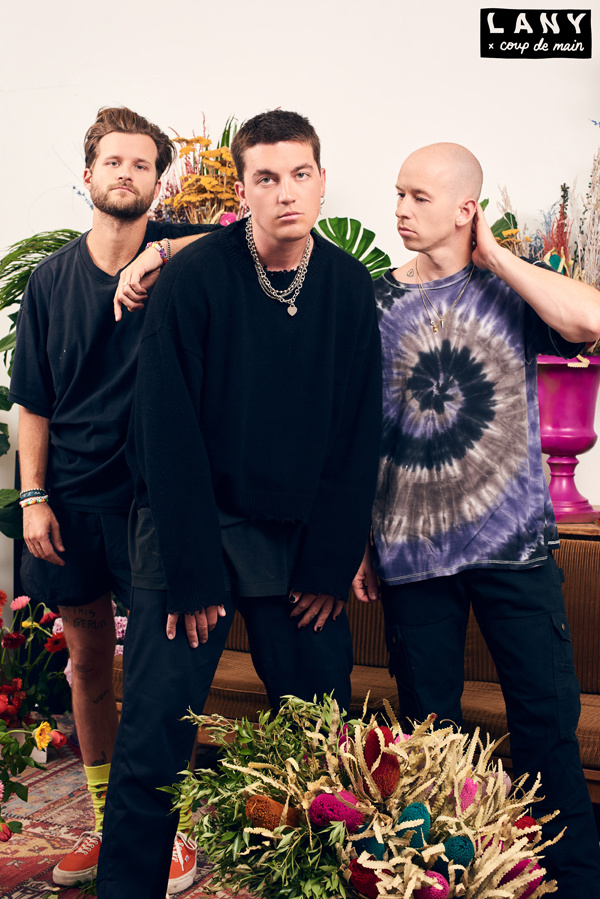
When I catch up with Klein on the phone a few week’s following the aforementioned Auckland show, it’s clear that evening is still playing on his mind. Though he laughs it off, telling me that he still has some of the emergency pills the doctor has given him, the stress of not being able to deliver a perfect experience for a fan just isn’t plausible at this point in time for Klein.
At the same time, Klein is already thinking about what’s next, revealing to me that he might already know the name of the next LANY album. Having now wrapped up touring for ‘Malibu Nights’, and completed all 100 shows, who knows what will come next for the band (although, maybe we do).
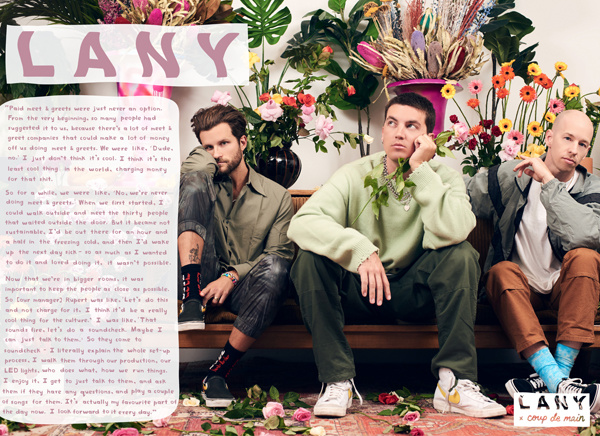
COUP DE MAIN: How do you kind of work yourself up to play shows when you aren’t feeling 100%? It must be such a hard thing because you want to put on a show at the same level every night?
LANY - PAUL KLEIN: Yeah, it actually really stresses me out. I don’t remember the last time, or if we’ve ever had to cancel a show. It was getting pretty grim there in Auckland for a second, even the doctor who looked at me was like, "Honestly, it’s pretty 50/50, I don’t know what’s going to happen." So that’s always such a shitty feeling because it’s not like we can even reschedule. So it really stresses me out, but thankfully we were able to pull through. I think adrenaline is a really amazing thing, something happens literally ten seconds before you go onstage and your body goes, ‘Nope, you gotta play a show.’
CDM: How have the Asian shows been? Manila looked insane.
PAUL: It’s been really crazy, and really encouraging. There’s really no rhyme or reason why some of these places are just blowing up, but obviously, we’ll take it. Manila was amazing, but even Kuala Lumpur, which was the next city, was super crazy, and doing two nights in Bangkok; over 7000 tickets - I think for most of these places, next time we come around we’ll be in arenas which is really exciting.
CDM: What’s the experience been like with the live ‘Malibu Nights’ shows so far?
PAUL: It’s just so rewarding to walk into a room and see people sing back with such fervour and intensity. I think the best thing about this whole thing is that nobody’s thinking about my life, or my story when they listen to these songs or sing these songs, or they come to our show - it’s very much them seeing themselves in the song. Heartbreak, and disappointment, and loss, and confusion, it’s something that every human being on planet earth can relate to. To walk into a room and see people absolutely going through it, and finding a lot of hope and life in the songs, you can’t ask for more than that really.
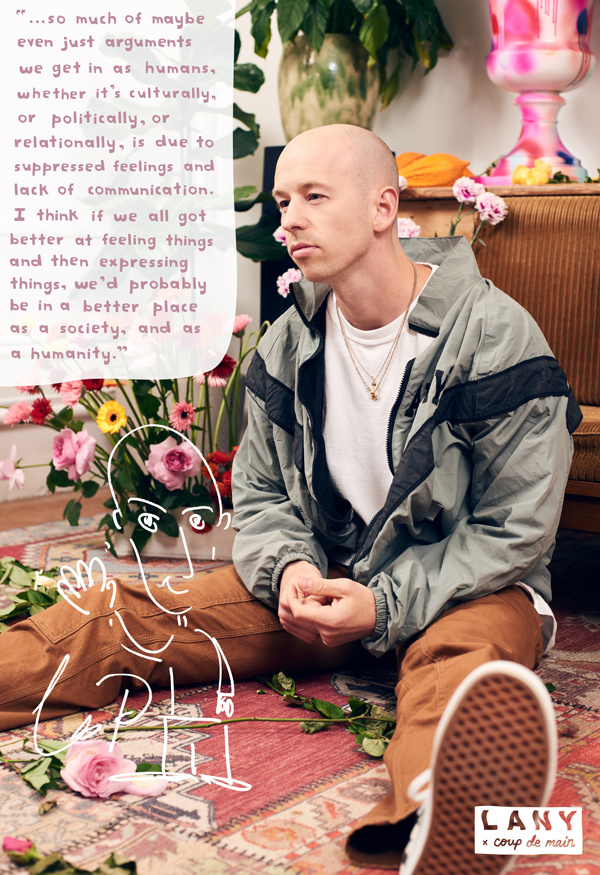
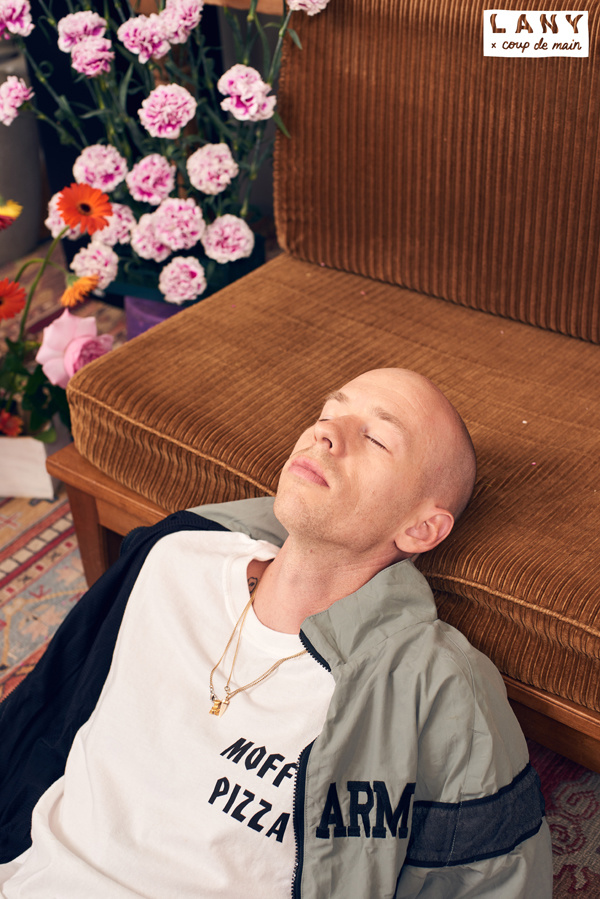
CDM: I saw you visited an orphanage in Thailand, which looked like a really emotional and humbling experience. How do you find things like that when you’re on the road touring, I feel like they must really ground you?
PAUL: Very rarely we’re in a city for more than one show. We’re in Manila for three and that was wicked, but the number of orphans in Thailand alone is just staggering, and we just had the idea - it’s good to give back to the community when you can. Coming in and playing a show is wicked, doing that for the city and the culture it’s super fun, my hope that every time we play a show is that whoever walked in with their heads down would leave with their heads held high, but it’s also really important to give back to the community in a practical way. When we had that opportunity to go, we brought all the kids toys, we also gave a cheque to keep the place running, we got to serve lunch - it’s always good for your soul. You always go there thinking that you’re going to brighten someone else’s day, but they always end up brightening yours.
CDM: I think right before this tour started, you had a brief holiday - your first week off since 2016 if I’m not mistaken. How was it?
PAUL: It was good! I went to Mexico - somebody was really passionate about us playing their wedding, or the after-party of their wedding, which was really cute. I just decided I’d go down four or five days early and just sit by the pool and read some books, and try to take a break. I hadn’t had a break in the longest time - I think the last time I stopped by a pool was in 2016, I went to Palm Springs for five days, and that’s when I designed all the ‘kinda’ merchandise and stuff. That was literally the last time I’ve had a string of five days off like that, where I wasn’t having to have to do anything LANY-related, aside from whatever I wanted to do creatively. It’s always good to have those moments, even if they only come around every three years. <laughs>
CDM: Do you think it’s important as an artist to have rest?
PAUL: I think if you really love it, you never escape it. I’m not really trying to escape LANY by any means, LANY is basically all I have, it’s my life and I love it more than anything. If I can be doing it all the time, I want to be. Doing music in 2019/2020, if you are really passionate about being creative, there are so many different facets you can flex your creativity in - whether it’s show posters, graphics, merch, album art, there’s so much. So much of what we do is playing shows and writing songs obviously, but every now and then if I could just sit by a pool and draw merch, and think of cool ideas outside of writing songs, I think it’s really important.
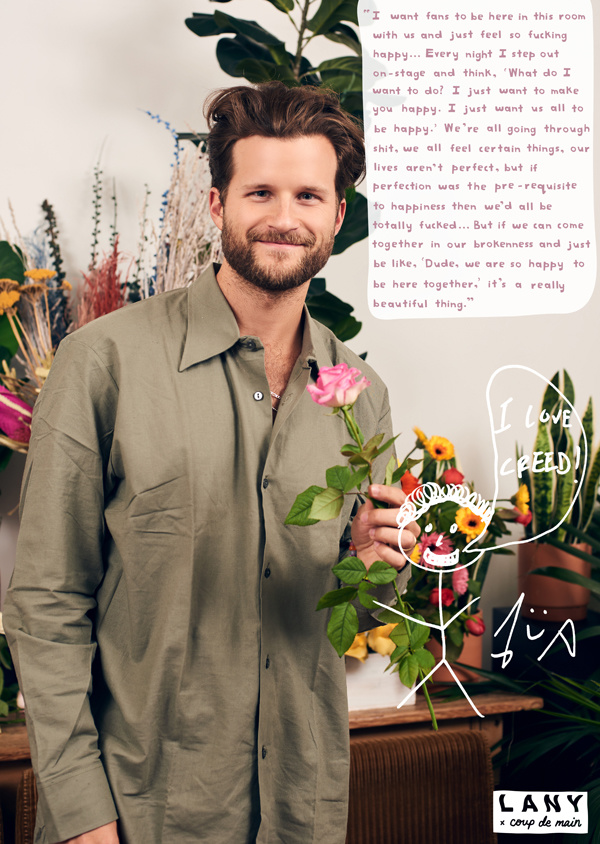
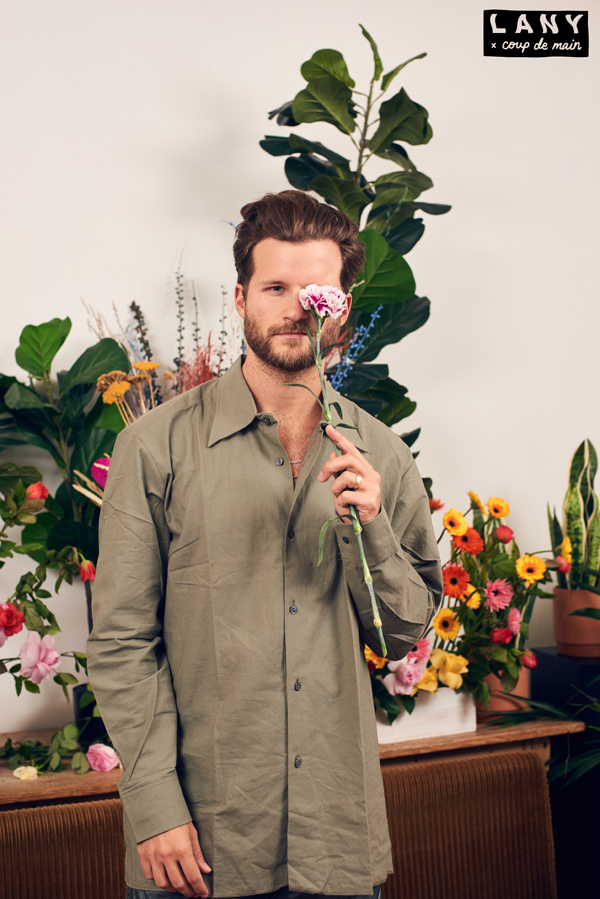
CDM: Are you always working on your craft as a songwriter, even if you aren’t thinking about writing songs?
PAUL: Songwriting is a muscle, for sure - so if you’re not exercising it, it gets weak, and if you are, it gets stronger. It’s really difficult for me on the road to be writing songs, it’s basically impossible. I don’t ever have a down second, and if I do, I’m trying to go to sleep. I’m dialled into keeping a running list in my notes of one-liners, and concepts, and thesis statements that I can build around. Even today before getting on the plane, I had a thought, I put it down in my phone, so that way when it’s time to go home and make Album #3, I’ve got all these reference points.
CDM: As a songwriter, you share so many of your emotions with your audience and with the world. Do you think it’s important as humans to embrace emotions, rather than hide away from feeling them?
PAUL: Of course. I think so much of maybe even just arguments we get in as humans, whether it’s culturally, or politically, or relationally, is due to suppressed feelings and lack of communication. I think if we all got better at feelings things and then expressing things, we’d probably be in a better place as a society, and as a humanity.
CDM: Do you ever feel afraid to share so much of yourself with other people / your fans?
PAUL: I don’t, just because I never even really think about how much I’m sharing - I guess I grew up kind of gravitating towards artists who shared their emotions and articulated their experience really clearly. That’s just what I always placed the value on and gravitated towards. Me, trying to be mysterious, is almost counter-intuitive to me - the whole point of writing songs to me is to articulate a message and maybe putting things into words that other people can’t.
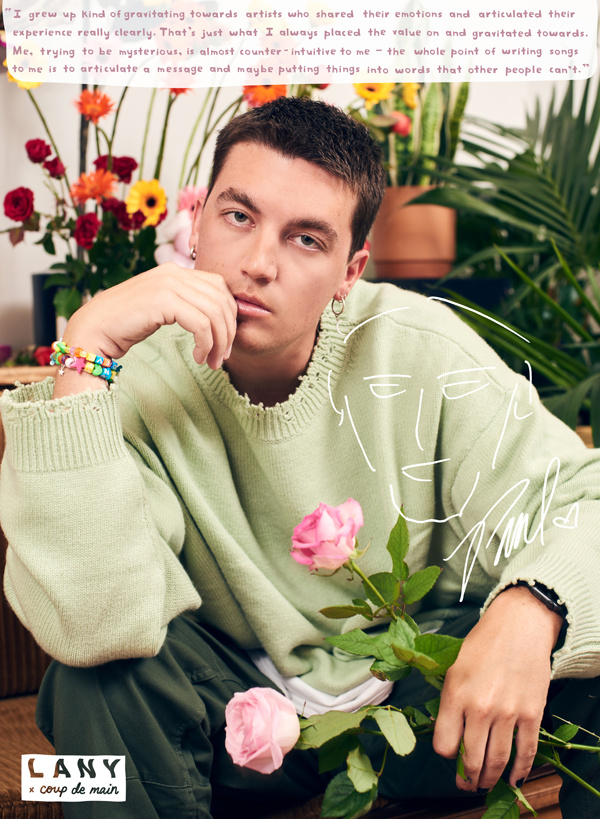
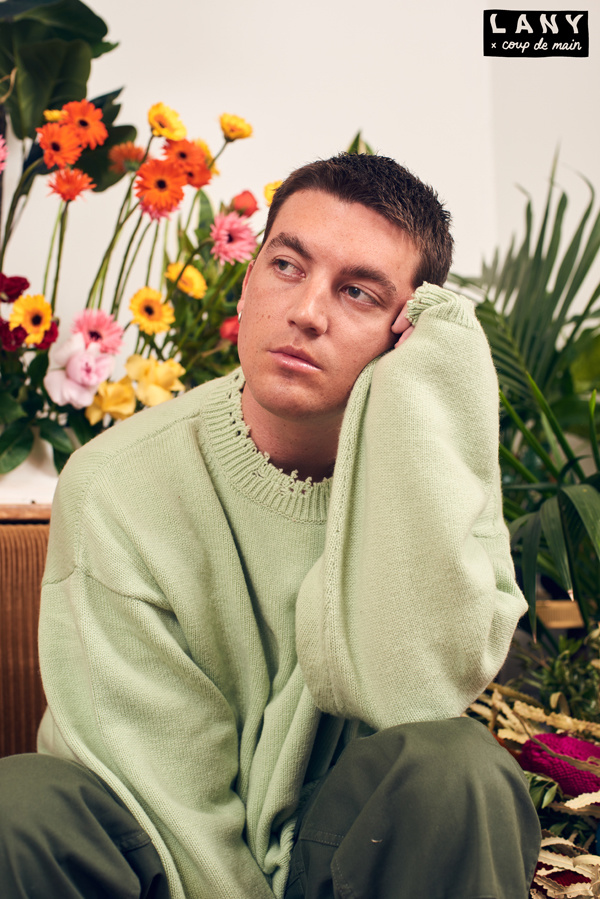
CDM: Why do you think feeling the same feelings as other people is such a uniting feeling? In our last interview we spoke about how your fans can relate to the songs so much, especially when they see them live.
PAUL: For those eighty minutes that we’re in the room, we’re all there for one reason - and that’s to play a show, and our crowd is very much a part of our show. I’m not sure if I’ve ever been to another concert where someone has invited the crowd to participate vocally as much as I do. I just started realising how many times I say "let’s go!" or "come on!" or "you sing!" I probably say it 100 times every night. <laughs> It’s like leading a choir. For those eighty minutes we’re all there for one reason, united under this one love for music and the songs that we’re singing, so it’s a really powerful moment where everyone can be in the same room, feeling the same thing, for the same reason.
CDM: In our last interview in New Zealand, you told me that to you, love was “selflessness and making an effort.” Do you still think those two things are the most important parts of love, nearly two years on since that conversation?
PAUL: I just think that love is a choice, and you make time for the things that you love. Romantically speaking, I think those feelings, obviously if you’re with someone long enough, they can go in and out, and ebb and flow, but making that decision to love through the best of times and the worst of times, I think that’s true love.
CDM: Has the concept of love changed for you in the past few years?
PAUL: I’m kind of still figuring it out. If I ever claim to have arrived, then I will have failed. <laughs>
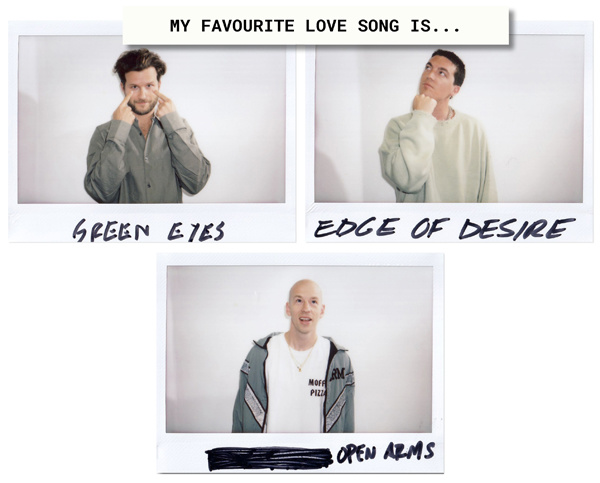
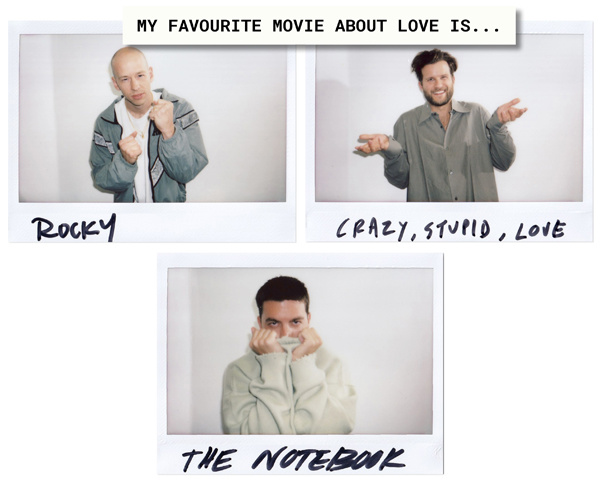
CDM: Do you have the answer yet to the question in ‘Malibu Nights’, "What do you do with a broken heart?"
PAUL: Yeah, I think you wait it out. Time seems to really heal all wounds, and it’s crazy to look back and remember how I felt eighteen months ago, or however long ago it was, 'til now, and I just kind of lol. <laughs> It’s really crazy what time provides.
CDM: You can look back at the songs as chapters of your life.
PAUL: Yeah! I mean, I really was shattered, and then nothing really happened over those eighteen months. I mean, I guess a lot happened, but basically, time just happened, and you eventually just completely heal up, and you’re like, ‘Damn, I can’t believe she wrecked me like that.’ Lol. <laughs>
CDM: What was it like writing the title-track ‘Malibu Nights’ with Tobias Jesso. Jr? How did working with him come about?
PAUL: This is actually a really cool story. I had a day scheduled with him, I’d never met him, I knew nothing about him, other than that he helped write a really big Adele song. I knew nothing. 'Malibu Nights' was the second to last song that we wrote for the album, so at this point, I definitely woke up that morning super hungover and just feeling like I was on the brink of death. <laughs> I showed up to the studio an hour early because I just had nothing to do, or no-one to see or anything. I sat down at Conway, which was the studio I was writing a lot of these songs out of, I got on the piano and literally wrote the chorus almost immediately. Because I didn’t know anything about Tobias, I was about to call Rupert [Lincoln; LANY’s manager] and say, "Hey, I’m on a wave right now and I kind of don’t want it to be disrupted." So I was going to ask Rupert to cancel the session with Tobias, but before I picked up the phone to make the call, this 7-foot dude walks through the door. He’s like, "Paul, what’s up man?!", and throws his arms out super wide, and I was like, 'What the fuck is going on?’ I gave him this big hug and he gave me this big hug, and we talked for a little bit. I thought he was super quirky, but I felt really safe. I was like, "This is kind of what I was working on," and he was like, "I love this." I got to totally spill my guts and tell him everything that had happened, and everything that I was feeling and thinking, and he was so understanding. During this time, I totally preferred to write with females, I just love the brain of a female and when you think about when you’re a kid and shit goes wrong, who’s the first person you run to? It’s your mom. There was just so much truth to that when I was working with female songwriters, I just felt way more safe and way more comfortable, and I felt like I could be really honest and really vulnerable. Tobias definitely made me feel all of those things, and I think the best thing about him was he’s such a great editor. I have all these ideas and I would just throw them out and he’d be like, "I like this one, this one is the strongest concept." It was while writing ‘Malibu Nights’ that when we hit a part of not knowing what to do, I would just play that chord progression and he was like, "You keep playing that, that needs to be the motif of the song," so that was really cool that he recognised that. It was a great day, we wrote the song in one day. I remember texting him and being like, "Guess what? I think we’re going to call the album 'Malibu Nights'," and he was flipping out.
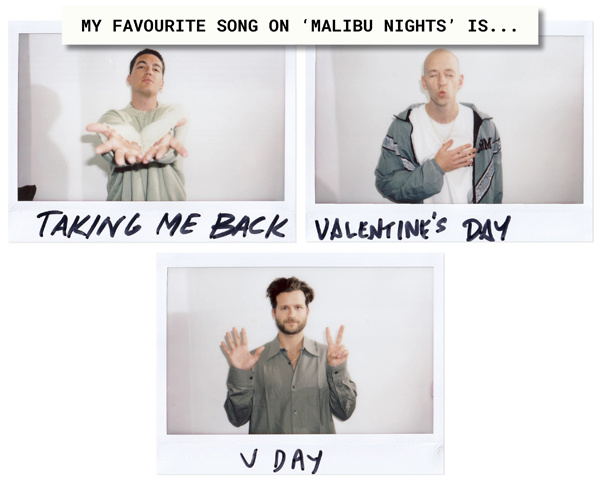

CDM: You did your first ever official LANY collaboration with Julia Michaels - and you told me that you’ve also recently worked with Lauv in the studio. How do you find working with other artists in the studio and hearing their inputs and thoughts?
PAUL: I was going to say that the other writers we worked with on ‘Malibu Nights’ were mostly songwriters but that’s not true at all, because Sasha [Sloan] is her own artist as well. It’s really cool, I think Sasha is actually my brother - when we get in a room and write a song together, she knows and we know that it’s going to be a LANY song. But then when you’re in a room with Lauv, who knows who wants it? If it’s really good I’ll be like, "It’s not your song!" With Julia, her vocal is so unique, she’s such an incredible vocalist, so it was a no-brainer that the song wasn’t going to exist without her voice on it. But as far as collaboration in the songwriting sphere, I’m so for it - I don’t ever want to write a song by myself ever again. But I don’t think that we’ll ever feature anybody ever again. I’m down to go sing with other artists if they want that, but I don’t really think features are for us in the future.
CDM: "I know I'm not perfect but we were" you sing in ‘If You See Her’ - I’ve always found the concept of perfection so fascinating, it’s something that humans strive towards despite it being so unattainable sometimes. Why do you think that people are so drawn to the idea of perfection?
PAUL: I guess because perfection equals zero problems? Nobody wants problems. It’s such a stupid-- How boring would that be? That’s an interesting argument and concept - perfection is overrated though.
CDM: Have you started already thinking about what the third LANY album will sound like?
PAUL: I actually don’t know what it’s going to sound like, but I think I might know what it’s called though, which is crazy.
CDM: Do you normally have that idea so early on, before it’s conceptualised?
PAUL: No, I don’t. I think I know what it’s called, and I also have a list of ideas of what it’ll be called. I know my plan, and the plan is to go to Nashville for all of September - I’m going to be writing with some songwriters in the country space that I really love and respect. I think when you take a country song and you break it down, it’s just an unbelievably well-written song that has really strong concepts and really strong communication, and the melodies are always built so well, they’re so singable. After playing 500 or 600 shows, I know that all I really want is for people to sing along with me. So going to Nashville and trying to write 20 indisputable songs, and then bringing them back to LA and working with whatever producer we decide on, and making them sound super fresh and LANY and 2020, I think is what I’m really excited about.
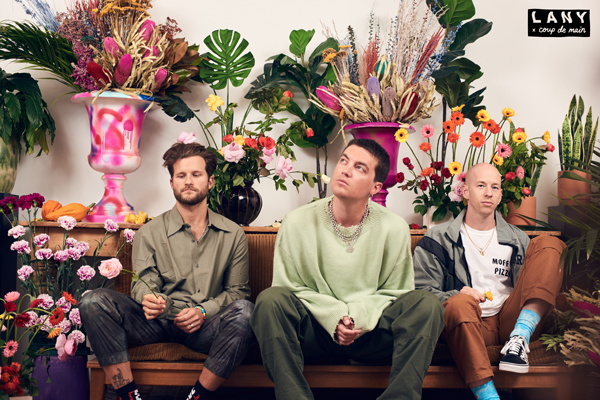
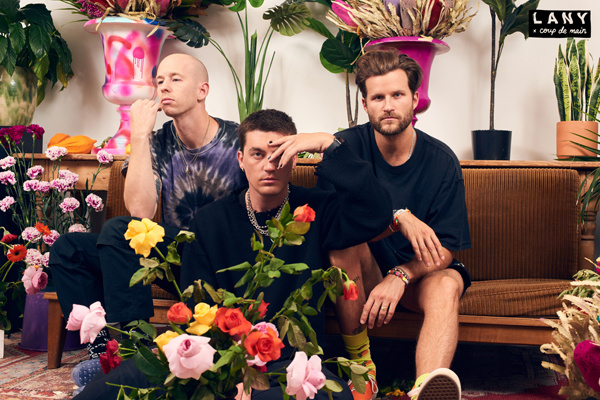
CDM: At the end of your show, the classic children’s book ‘Goodnight Moon’ flashes on the screen. What’s the significance of that book?
PAUL: My mom used to read it to me! I was reminded of the fact that book exists, and the moon is such an integral part to this era, it’s the moon era - so having the cover of ‘Goodnight Moon’ is like, ‘Goodnight, the show is over,’ it’s fucking perfect.
CDM: You tweeted about your live shows recently: “You can be sad but for the next 2 hours we’re gonna be happy.” Is it important for you to make your shows feel like a space where people can lose themselves to their emotions almost as a form of escapism?
PAUL: Yeah! It came out of my mouth in Orlando, it wasn’t pre-meditated. I am super, super aware of every second - I don’t let a single second slip away from me during shows. You can lose a crowd, even in the span of ten seconds if you aren’t careful, so I hold onto every second so carefully. I just started noticing, like, ‘Oh my god, I’m so happy to be on-stage. I’m so happy to be here.’ Then I start thinking, ‘I think these people are so happy too,’ and I just want them to be happy. I want them to be here in this room with us and just feel so fucking happy. So, it just came out of my brain and it’s just become this thing that I meditate on and I think about and I reflect on. Every night I step out onstage and think, ‘What do I want to do? I just want to make you happy. I just want us all to be happy.’ We’re all going through shit, we all feel certain things, our lives aren’t perfect, but if perfection was the pre-requisite to happiness then we’d all be totally fucked.
CDM: It’s kind of an impossible dream.
PAUL: Yeah. <laughs> But if we can come together in our brokenness and just be like, ‘Dude, we are so happy to be here together,’ it’s a really beautiful thing.
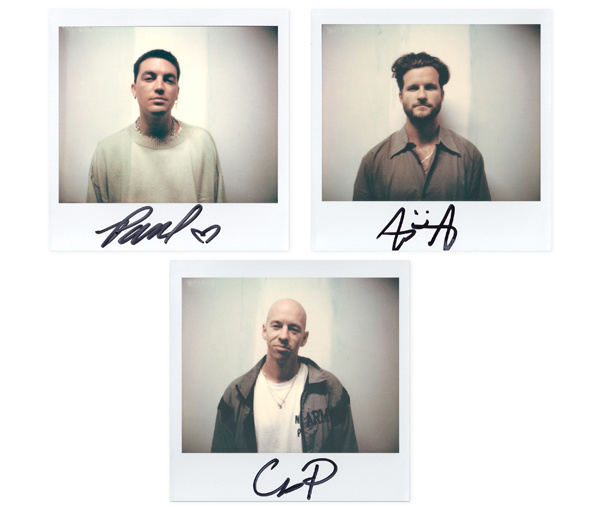
CDM: For your North American tour you refused to charge for meet & greets, and instead had a way to randomly draw people to hang out at soundcheck, which is really admirable - especially as touring can be so costly, and lots of artists will use paid M&Gs as a way to recoup costs. Why are you so particularly passionate about not monetising your relationship with fans?
PAUL: It was just never an option. From the very beginning, so many people had suggested it to us, because there’s a lot of meet and greet companies that could make a lot of money off us doing meet and greets. We’re just like, "Dude, no." I just don’t think it’s cool. I think it’s the least cool thing in the world, charging money for that shit. So for a while we were like, "No, we’re never doing meet and greets." When we first started, I could walk outside and meet the thirty people that waited outside the door. But it became not sustainable, I’d be out there for an hour and a half in the freezing cold, then I’d wake up the next day sick - so as much as I wanted to do it and loved doing it, it wasn’t possible. Now that we’re in bigger rooms it was important to keep the people as close as possible. So [our manager] Rupert was like, "Let’s do this and not charge for it, I think it’d be a really cool thing for the culture." I was like, "That sounds fire, let’s do a soundcheck. Maybe I can just talk to them." So they come to soundcheck, I literally explain the whole set-up process, I walk them through our production, our LED lights, who does what, how we run things. I enjoy it, I get to just talk to them, and ask them if they have any questions, play a couple of songs for them. It’s actually my favourite part of the day now. I look forward to it every day.
CDM: It’s so cool to see that two-way relationship with you looking after your fans so well.
PAUL: We’ve been wanting to do this forever. You look at people like Dave Matthews, it’s funny, nobody really talks about him but he has one of the most insane, loyal fanbases in the world because he prioritises people. That’s it, we would be nothing without people, so you’ve got to take care of your people.
CDM: In Australia, you talked a bit about a book called ‘Big Magic’ which explores the idea that you don’t have to be miserable to be creative. Is that something you’ve been thinking more about at the moment?
PAUL: It’s very self-aware of me, but I don’t think self-awareness is a bad thing; it’s a good thing. As broken as I was in the first half of 2018 when I was like, ‘This is for sure the worst fucking thing that’s ever happened,’ I also knew that it was the best thing that had ever happened, because I had so many thoughts and feelings and emotions - just completely overwhelmed by all of them - which made it kind of easy to write songs. There’s a lot of artists and poets that really worked and maybe thrived from pain, or under the influence of pain, so it’s always scary to think, ‘Nothing super dramatic is going on in my life, I’m not super heartbroken or pressed about anything. What do I have to say?’ That’s why for the last three months, any feeling that hits me, I write it down. I’m not worried at all, but I do think it’s a legitimate argument, and it’s something that a lot of artists face, ‘How do I create from a place of joy and comfort, versus pain and suffering?’
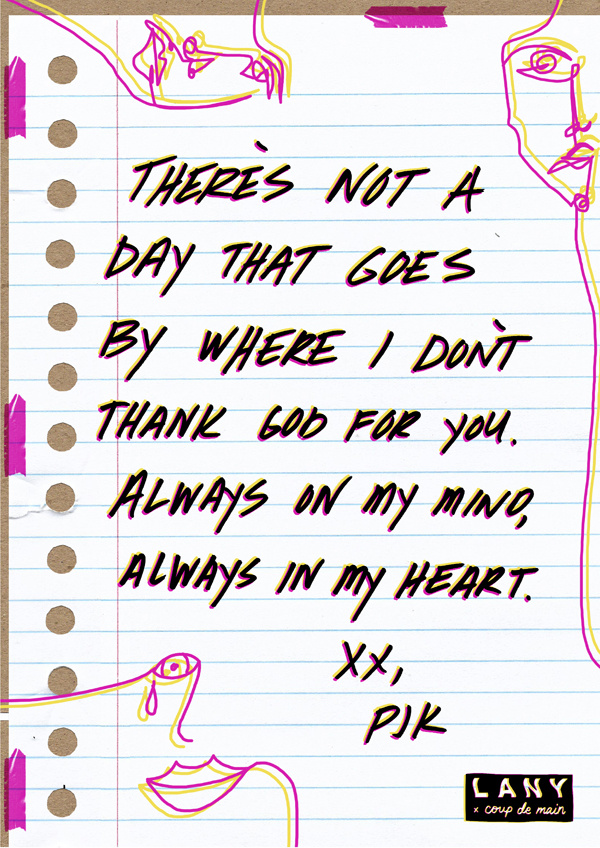
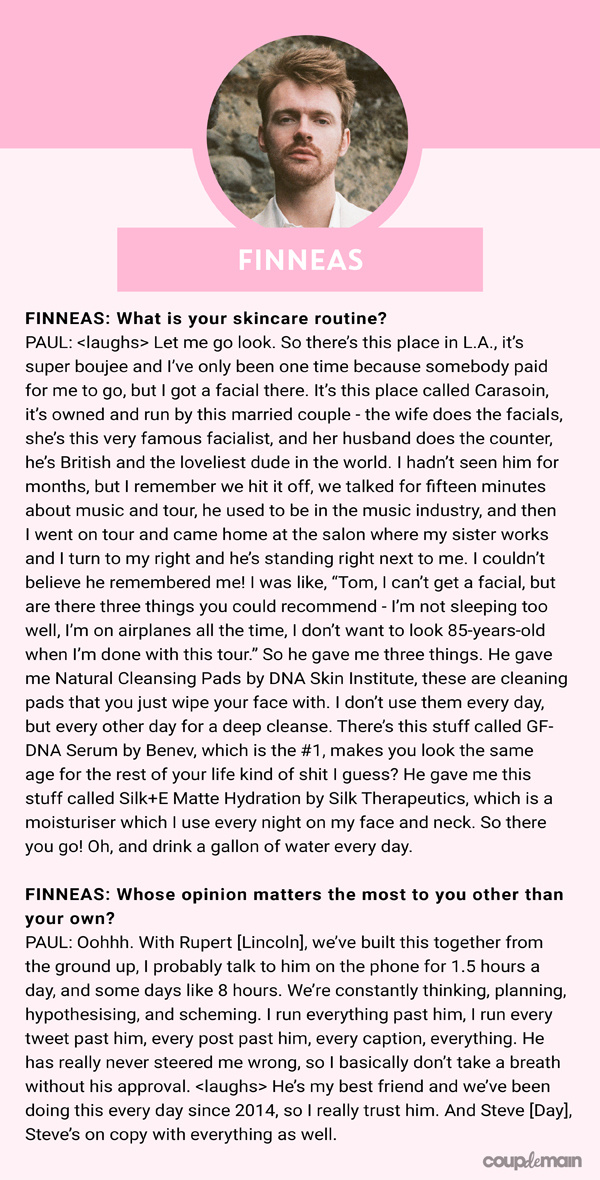
PHOTOGRAPHY BY KAREN ISHIGURO
GROOMING BY LOCHIE STONEHOUSE
ALL FLORAL ARRANGEMENTS BY FLORAL STYLIST
LANY’s album ‘Malibu Nights’ is out now - click here to purchase and watch the ‘Thick And Thin’ music video below:


 LANY
LANY